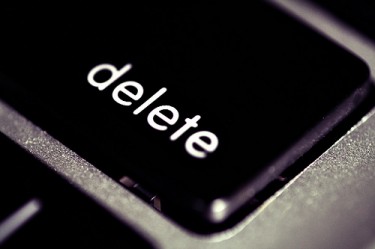A decision [EN] by the Supreme Court of Russia on June 15 to “exempt” online news media outlets of responsibility for user comments has in fact turned out to be the introduction of a full-scale censorship procedure. Roskomnadzor, a federal service that supervises Internet and mass media communication for the Russian Ministry of Telecommunications, has introduced a new “one day rule” that says online media must delete or edit “inappropriate” comments on their websites within one day of being notified or risk losing their mass media registrations.
Forbidden topics are listed in Article 4 of the law “On Mass Media” [RUS]. These include incitement to hatred, terrorism, and violence, links to pornography, and disclosure of state secrets.
Roskomnadzor issued its first legal warning to a website Apn.ru by e-mail on June 23, but at that point it was not clear how quickly the comment should be deleted, or whether an official demand could be sent by e-mail. On July 6, Roskomnadzor published [RUS] a document describing the guidelines for notification with the lengthy title: “Procedure for Issuing Appeals to News Media Outlets that Circulate in Telecommunication Networks and on the Internet on Inadmissibility of the Abuse of Freedom of Mass Information” (full text [RUS])
The procedure is as follows.
- A Roskomandzor employee makes a screen shot image of the inappropriate comment, saves it on a hard drive, and prints it.
- Then an official “responsible for government control and law enforcement online”, approves the evidence of “abuse of the freedom of mass information” (the document clearly says “approve” not “judge” or “decide”).
- After this, the department sends an e-mail and a fax to the website owner with an order to delete or edit the questionable comment.
- If the media outlet does not follow the order within 24 hours, it will receive a legal notice. Several notices will lead to a lawsuit against the media outlet. If Roskomnadzor wins the lawsuit, the website loses its mass media registration.
Neither the law “On Mass Media” nor Roskomandzor explain if the website would be shut down after losing its registration, but for most commercial media outlets it would mean an inability to function legally (get paid for ads, pay wages to its employees, etc).
Sergey Sitnikov, head of Roskomnadzor, explained [RUS] the goal of his department was to “prevent further dissemination of unlawful information,” but many Russian bloggers were disturbed by the idea, and heatedly discussed the matter on Habrahabr [RUS], an IT-related portal.
Some bloggers tried to look on the bright side (unsuccessfully). StrangeAttractor wrote [RUS]:
Если закон запрещает призывать через интернет к актам террора и хулиганства, то это нормально и хорошо. Но если запрещает высказывать своё мнение о чём либо … или гордиться своим национальным наследием …, то это чистой воды маразм и провокация
Newpravda wrote [RUS]:
С одной стороны мысль конечно хорошая, поясню – не давать права людям которые занимаются террором права слова, но зная нашу действительность под эту статью будут подводить всё что угодно, не удивлюсь что и крокодила Гену с Чебурашкой запретят за пропаганду чего нибудь.
Various effects and implications of the law have also been discussed Vitaliidaniuk expressed [RUS] skepticism about the efficiency of the document, arguing that it would be very hard to control Twitter comments often posted next to the articles or in integrated commenting systems (like Disqus or IntenseDebate).
Voldar suggested [RUS] that the awaited National Search Engine [EN] might be used to look for inappropriate comments and automatically send notices to the authors. XaosSintez wrote [RUS] about the huge potential for fake Roskomnadzor notices to block any kind of discussion. And xoco shared [RUS] his story of how authorities already monitor and control online and offline expression:
Печально все это. Как причастный к созданию одного из сайтов о городе Люберцы хочу поделиться своей историей. На форуме этого сайта ведется обсуждения о плохих дорогах, новостройках, чиркизонах. Так вот, там на форуме люди собрались выйти на улицу с демонстрацией на тему — почему ямы на дорогах полметра глубиной, ну и _поразмышляли_ о том что куда это годится и не перекрыть ли дорогу демонстрацией. В тот же день мы получили сообщение от «органов» из которого следовало, что мы должны предоставить всю информацию о пользователях активистах — ip, время захода и т.п. Якобы эти люди занимаются экстремистской деятельностью. Что будет дальше? Свободой слова тут и не пахло.
As a result of the discussion, bloggers established a hashtag on Twitter #ru_cenz in order to track all the incidents related to the new measures of content removal and RuNet censorship in general.
The latest practices introduced by Roskomnadzor not only violate the text of the Russian Constitution, that forbid any kind of censorship, but also appear to contradict president Medvedev's point of view on the matter [RUS]. The case illustrates several features of the current political regime: lack of respect for laws and human rights, contradiction between words and deeds, and finally, a clear will to affect and control RuNet.









4 comments
Dear Andrey,
Really good with a follow-up on this. When Roskomnadzor was formed a couple of years ago(?), I feared exactly this development.
Yours,
Vilhelm
Dear Vilhelm,
actually the structure exists from 1993 (it was called “Gossvyaznadzor”). During the administrative reform it was separated from Minsvyaz. It happened in 2004. And only recently (I guess in 2008) it gained these “control” functions.
Dear Andrey,
Thanks for pointing the details out to me! I had forgot about the specifics, although having myself written about it. I guess it was back in 2007 also that Rossvyaznadzor and Rosokhrankultura were merged.
Yours,
Vilhelm